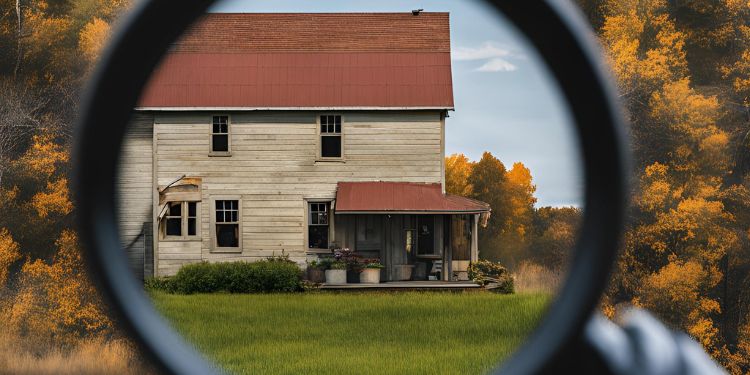For most people, in most circumstances, it makes more sense to bug in, rather than bug out in the face of a disaster. Granted, there are always exceptions to that, such as when there is flooding or wildfire. The people of Paradise, California sure wouldn’t have done well to bug in, when their entire town burned to the ground in November of 2018.
It can even be argued that it doesn’t make sense to bug in, when faced with rampant lawlessness from a breakdown of law and order. Staying home in that case just might make you a target.
While living anywhere in the midst and aftermath of a major disaster is sure to be challenging, trying to survive in the wild would be nearly impossible. Without getting into all the problems associated with trying to live off the land, let’s just say that unless you have a prepared place to go to, stocked and equipped for survival, you’re better off staying home in most circumstances.
That doesn’t mean that bugging in is going to be any bed of roses either. If we assume that electric power, municipal water, gas service, sewage and the supply chain will all be down, there’s not a lot to be said for staying in the city. The only good thing about bugging in is that we’ll be in our homes, with all our possessions available to us.
But that doesn’t mean that any of us are automatically prepare for bugging in. We can have a stockpile of food and other essential supplies and still end up in trouble, when things go to pot and we’re trying to survive. The problem is, there’s just so many things we need, that it’s extremely easy to forget something critical. Let’s look at some possibilities.
Securing Doors and Windows
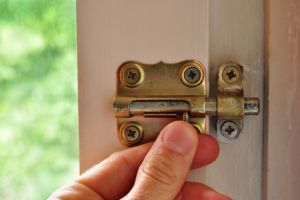 This isn’t so much a thing to stockpile, as it is a thing to do. We preppers have a bit of a tendency to count on our guns for safety. As a fan of firearms myself, I really don’t have a problem with that.
This isn’t so much a thing to stockpile, as it is a thing to do. We preppers have a bit of a tendency to count on our guns for safety. As a fan of firearms myself, I really don’t have a problem with that.
The problem I do see though, is the risk of more than one assailant attacking our home at once.
It’s just as important to properly secure your doors and windows, as it is to make sure you have enough ammunition for your favorite gun. I’m not talking about the “home security” that they typically talk about either. A deadbolt won’t stop someone from getting in, if they really want to. Nor will a locked window keep anyone out. You need to up your security game, making it as hard as possible to get into your home. That will give you time to react, before the shooting starts.
That is why I’ve set up these traps and alarms on my property against looters and intruders. Most of them won’t be able to get past these defenses. And if any looter somehow gets onto my property, I will have known about them long enough to prepare.
Sewage Disposal
Few preppers have a ready plan for dealing with human waste in an extended emergency. All we have is a vague idea of what we’re going to do… something about digging a hole and building an outhouse.
The problem is, that human waste is one of the most toxic substances on the face of the earth. If we don’t have a good plan and the wherewithal to implement it almost immediately, then we’re putting our family and our neighborhood at risk. Better make sure you can get that outhouse in place in no more than a couple of days. In the meantime, you can collect your waste in a five-gallon bucket.
Why not just use the five-gallon bucket as your answer then? Because you’ll still have a disposal problem. Once the bags are full, you’ll need to take them out of the bucket and replace them. Then what are you going to do with the bags of waste? Unless you have a hole in the ground to bury them in, you’re going to have a problem.
Lime
 Lime is a useful substance to go with that outhouse, as it can be sprinkled in on top of the waste to help deep down the odor of decay.
Lime is a useful substance to go with that outhouse, as it can be sprinkled in on top of the waste to help deep down the odor of decay.
While a fairly inexpensive item, it can be hard to find; especially since most of us don’t use it regularly. Add a couple hundred pounds to your stockpile.
Sufficient Water Storage
I’m a big fan of rainwater capture, like many preppers are. But I’ve come to recognize one big problem with it, especially for those of us who live in more arid regions. Where I live, there’s enough rainfall for my wife and I to survive, assuming we can capture and store it all. But because it all comes in only a few months; we can’t store enough water to get us through. We will likely run out of water, before the next rainy season comes.
For us, the other option is to haul water from the lake, which is 3.5 miles away. That’s not an ideal option, especially when we reach a point where we don’t have gasoline and I have to haul that water manually. I’m working on increasing my water storage capability; but we’re talking about thousands of gallons, not just a few rain barrels.
Given these challenges, it’s clear that having the right knowledge and tools is crucial for anyone looking to live more independently and sustainably. The Self-Sufficient Backyard provides just that—comprehensive guidance on a wide range of homesteading topics, including water collection.
This guide offers detailed insights on creating efficient and cost-effective water collection systems tailored to your needs. Whether you’re dealing with limited rainfall or aiming to reduce dependence on external water sources, the strategies outlined can help you maximize every drop.
Power for the Fridge
Most of us act like refrigeration is going to go by the wayside, in the event of a serious disaster. Okay, I get it, with the power out, how can any of us expect to run our fridge, right? But wait, just how much electricity does that fridge consume? Is there any way we can keep it running through the disaster?
 Modern refrigerators are extremely energy efficient, only using a few hundred watts of power per day.
Modern refrigerators are extremely energy efficient, only using a few hundred watts of power per day.
That means you could actually generate enough electricity to run it off of solar panels, if you had enough solar panels.
So, just how many do you need?
For the average home refrigerator, three to four 100 to 120 watt solar panels would generate enough power to keep the fridge running.
You’d need at least 100 amp-hours of battery backup to go with that, so that the solar panels could charge the battery and the battery could power the fridge. The big question is, do you have that much? Most preppers only have one or two panels, not enough to keep the fridge running.
First-Aid Supplies
Everyone has a first-aid kit; but just how good is that kit? Most first-aid kits you buy, even the more expensive ones, just have enough supplies to take care of one injury. Not only that, but that’s assuming that the patient will be moved to a medical facility, where they will have many more supplies to use.
Related: 10 Medical Supplies to Stock Up on Before it’s Too Late
The truth is, one injury can use up a lot of supplies, if you can’t get your injured team member to a medical facility. Bandages need to be changed and wounds cleaned. That will have to go on for several days, making each injury use as many first-aid supplies as a dozen or so. Your kit probably doesn’t have that much, and even if it does, what about the next injury?
Fuel for the Fire
How much firewood do you have? How long will it last? Most of us have at least some firewood; but probably not enough. People who heat their homes normally with a wood fire, generally go through four to six full cords of hardwood firewood per winter. Most of what is sold today is “face cords,” rather than full cords. Those face cords only have one-third the amount of wood that a full cord does.
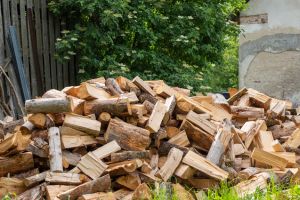
Unless you have six full of cords of hardwood firewood stacked in your backyard, I’d say you probably don’t have enough. Don’t count on softwood firewood to do the job for you or even wood that you can scavenge out of abandoned homes. That’s going to be softwood as well. It just doesn’t store enough heat energy, burning away rapidly.
Additionally, I’ve learned that under no circumstances should you burn these types of wood in a wood-burning stove.
A Means to Haul Firewood
Speaking of firewood, how are you going to replenish your firewood supply, once you’ve burned it up? Do you have someplace near your home, where you will be able to cut your own wood? Do you have a means to haul the wood home, once you cut it? With as much wood as you will need, you’re going to need a good plan for this.
Paper Goods
Paper towels and toilet paper are going to be worth their weight in gold in the face of a major disaster. Remember the great toilet paper shortage of 2020? That will be nothing compared to the shortage that will happen when there won’t be any resupply. At least during the 2020 shortage, there was TP in the warehouses. The problem was getting it into the stores.
We may as well figure that once the power goes out, we won’t see any more TP supplies for years. What we have when that happens, is all that we’ll have. With that being the case, it seems to me that there’s no such thing as having too much.
Disposable Plates, Cups and Forks
Speaking of paper goods, have you thought about using disposable plates, cups and forks, rather than washing them?
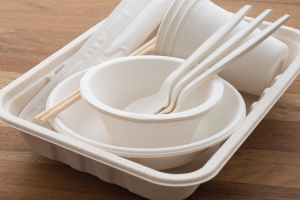
Water is likely to be in short supply, so if we can cut down on the number of dishes we have to wash, it will really help. But that means stockpiling them, along with everything else.
Normally, those plates and cups are a disposal problem; but they shouldn’t be during a crisis.
If we’re cooking and heating with wood fires, we can always burn those plates and cups right there. Just think of them as emergency fire starters.
Cleaning Supplies
Speaking of washing dishes, how’s your stock of cleaning supplies? Cleanliness is an essential part of preventing the spread of disease. If you can’t keep your home clean, then you’re probably going to be sick a lot.
This doesn’t mean that you have to have a lot of fancy products. It really just means that you need to select good products that you can get cheap; then stock up on them. Take a look at commercial cleaning products. They’re generally multi-purpose, very effective and available in five-gallon buckets, making them much cheaper to buy.
Pest Control
Speaking of disease, expect an invasion of bugs and other pests in the wake of any disaster. We can see from past disasters, that any disaster ends up causing an increase in the population of both insects and rodents. They feed off of the problems that we’re having, allowing them to grow and reproduce faster.
Here again, you don’t necessarily need to have fancy products. Better to find what the professionals use and try to buy it in bulk.
Plastic Bags
Finally, most people don’t have enough plastic bags. Those bags are useful for a host of things, from taking care of our food to taking care of our waste. This is another category of things where there’s really no such thing as “too much.”
Stock whatever you can, in a few standard sizes that will meet your needs. Considering that we’re talking about using them in a time of crisis, I’d recommend going for better quality, so that they don’t tear at the wrong time.
If you’re serious about being prepared for any scenario where bugging in becomes necessary, it’s crucial to have the right strategies and resources at your disposal. That’s where A Navy SEAL’s Bug-In Guide by Joel Lambert comes in. This guide is packed with the kind of expert advice you won’t find anywhere else, revealing the exact steps you need to take to transform your home into a self-sufficient fortress that can sustain you and your family for as long as needed.
Joel Lambert, a seasoned Navy SEAL, shares his hard-earned knowledge to ensure that you don’t just survive, but thrive, no matter how dire the situation becomes. Whether you’re a seasoned prepper or just beginning, this book is designed to be easy to read, understand, and implement, offering insights that can be applied by anyone—regardless of age or experience.
This guide is in physical format, ensuring you have access to this vital information even during extended blackouts or an EMP event.
You may also like:
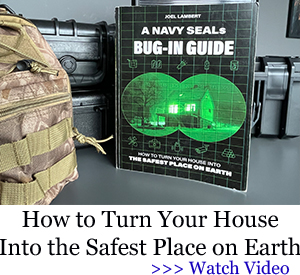 The First Water Source That Will Disappear in a Crisis
The First Water Source That Will Disappear in a Crisis
Ingenious DIY Chicken Projects
6 Signs Your Neighbor Will Become a Looter as Soon as SHTF
Bartering Items You Need to Stockpile for the Next Financial Crash
This Is Why You Should Not Build a Bunker
Read the full article here
